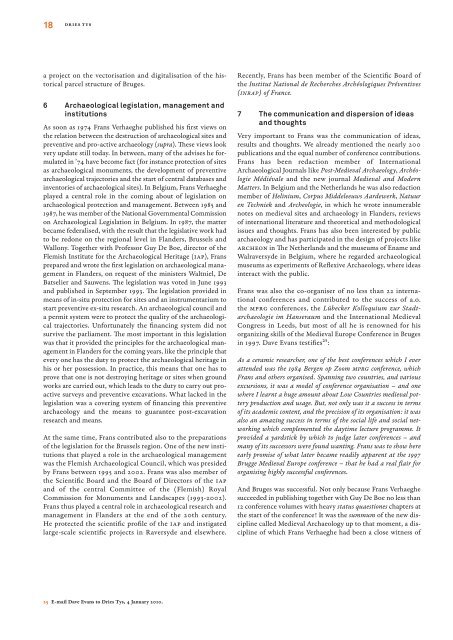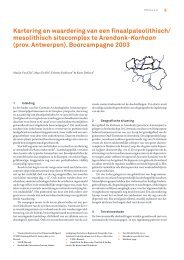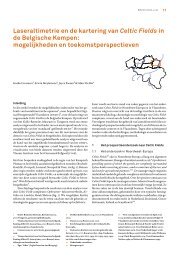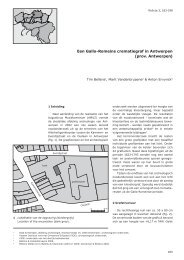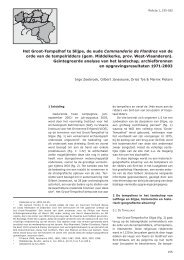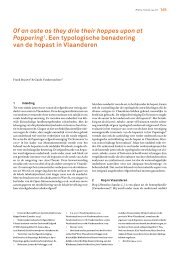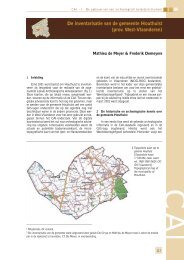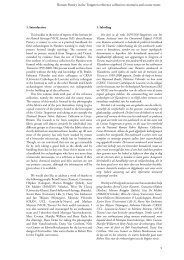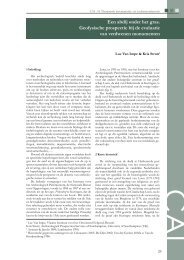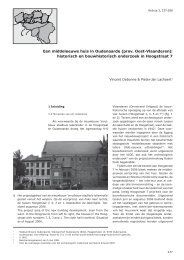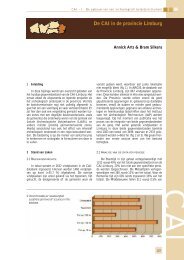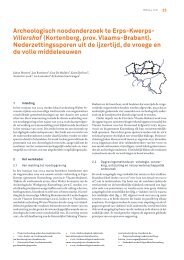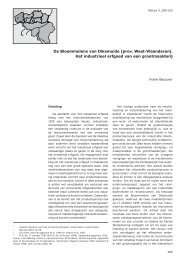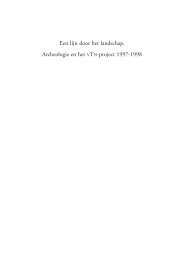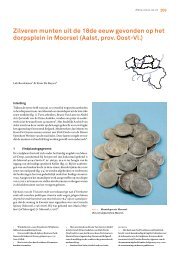Exchanging Medieval Material Culture Studies on archaeology and ...
Exchanging Medieval Material Culture Studies on archaeology and ...
Exchanging Medieval Material Culture Studies on archaeology and ...
Create successful ePaper yourself
Turn your PDF publications into a flip-book with our unique Google optimized e-Paper software.
18<br />
dries Tys<br />
a project <strong>on</strong> the vectorisati<strong>on</strong> <strong>and</strong> digitalisati<strong>on</strong> of the historical<br />
parcel structure of Bruges.<br />
6 Archaeological legislati<strong>on</strong>, management <strong>and</strong><br />
instituti<strong>on</strong>s<br />
As so<strong>on</strong> as 1974 Frans Verhaeghe published his fi rst views <strong>on</strong><br />
the relati<strong>on</strong> between the destructi<strong>on</strong> of archaeological sites <strong>and</strong><br />
preventive <strong>and</strong> pro-active <strong>archaeology</strong> (supra). Th ese views look<br />
very update still today. In between, many of the advises he formulated<br />
in ’74 have become fact (for instance protecti<strong>on</strong> of sites<br />
as archaeological m<strong>on</strong>uments, the development of preventive<br />
archaeological trajectories <strong>and</strong> the start of central databases <strong>and</strong><br />
inventories of archaeological sites). In Belgium, Frans Verhaeghe<br />
played a central role in the coming about of legislati<strong>on</strong> <strong>on</strong><br />
archaeological protecti<strong>on</strong> <strong>and</strong> management. Between 1985 <strong>and</strong><br />
1987, he was member of the Nati<strong>on</strong>al Governmental Commissi<strong>on</strong><br />
<strong>on</strong> Archaeological Legislati<strong>on</strong> in Belgium. In 1987, the matter<br />
became federalised, with the result that the legislative work had<br />
to be red<strong>on</strong>e <strong>on</strong> the regi<strong>on</strong>al level in Fl<strong>and</strong>ers, Brussels <strong>and</strong><br />
Wall<strong>on</strong>y. Together with Professor Guy De Boe, director of the<br />
Flemish Institute for the Archaeological Heritage (iap), Frans<br />
prepared <strong>and</strong> wrote the fi rst legislati<strong>on</strong> <strong>on</strong> archaeological management<br />
in Fl<strong>and</strong>ers, <strong>on</strong> request of the ministers Waltniel, De<br />
Batselier <strong>and</strong> Sauwens. Th e legislati<strong>on</strong> was voted in June 1993<br />
<strong>and</strong> published in September 1993. Th e legislati<strong>on</strong> provided in<br />
means of in-situ protecti<strong>on</strong> for sites <strong>and</strong> an instrumentarium to<br />
start preventive ex-situ research. An archaeological council <strong>and</strong><br />
a permit system were to protect the quality of the archaeological<br />
trajectories. Unfortunately the fi nancing system did not<br />
survive the parliament. Th e most important in this legislati<strong>on</strong><br />
was that it provided the principles for the archaeological management<br />
in Fl<strong>and</strong>ers for the coming years, like the principle that<br />
every <strong>on</strong>e has the duty to protect the archaeological heritage in<br />
his or her possessi<strong>on</strong>. In practice, this means that <strong>on</strong>e has to<br />
prove that <strong>on</strong>e is not destroying heritage or sites when ground<br />
works are carried out, which leads to the duty to carry out proactive<br />
surveys <strong>and</strong> preventive excavati<strong>on</strong>s. What lacked in the<br />
legislati<strong>on</strong> was a covering system of fi nancing this preventive<br />
<strong>archaeology</strong> <strong>and</strong> the means to guarantee post-excavati<strong>on</strong><br />
research <strong>and</strong> means.<br />
At the same time, Frans c<strong>on</strong>tributed also to the preparati<strong>on</strong>s<br />
of the legislati<strong>on</strong> for the Brussels regi<strong>on</strong>. One of the new instituti<strong>on</strong>s<br />
that played a role in the archaeological management<br />
was the Flemish Archaeological Council, which was presided<br />
by Frans between 1995 <strong>and</strong> 2002. Frans was also member of<br />
the Scientifi c Board <strong>and</strong> the Board of Directors of the iap<br />
<strong>and</strong> of the central Committee of the (Flemish) Royal<br />
Commissi<strong>on</strong> for M<strong>on</strong>uments <strong>and</strong> L<strong>and</strong>scapes (1993-2002).<br />
Frans thus played a central role in archaeological research <strong>and</strong><br />
management in Fl<strong>and</strong>ers at the end of the 20th century.<br />
He protected the scientifi c profi le of the iap <strong>and</strong> instigated<br />
large-scale scientifi c projects in Raversyde <strong>and</strong> elsewhere.<br />
25 E-mail Dave Evans to Dries Tys, 4 January 2010.<br />
Recently, Frans has been member of the Scientifi c Board of<br />
the Institut Nati<strong>on</strong>al de Recherches Archéologiques Préventives<br />
(inrap) of France.<br />
7 The communicati<strong>on</strong> <strong>and</strong> dispersi<strong>on</strong> of ideas<br />
<strong>and</strong> thoughts<br />
Very important to Frans was the communicati<strong>on</strong> of ideas,<br />
results <strong>and</strong> thoughts. We already menti<strong>on</strong>ed the nearly 200<br />
publicati<strong>on</strong>s <strong>and</strong> the equal number of c<strong>on</strong>ference c<strong>on</strong>tributi<strong>on</strong>s.<br />
Frans has been redacti<strong>on</strong> member of Internati<strong>on</strong>al<br />
Archaeological Journals like Post-<str<strong>on</strong>g>Medieval</str<strong>on</strong>g> Archaeology, Archéologie<br />
Médiévale <strong>and</strong> the new journal <str<strong>on</strong>g>Medieval</str<strong>on</strong>g> <strong>and</strong> Modern<br />
Matters. In Belgium <strong>and</strong> the Netherl<strong>and</strong>s he was also redacti<strong>on</strong><br />
member of Helinium, Corpus Middeleeuws Aardewerk, Natuur<br />
en Techniek <strong>and</strong> Archeologie, in which he wrote innumerable<br />
notes <strong>on</strong> medieval sites <strong>and</strong> <strong>archaeology</strong> in Fl<strong>and</strong>ers, reviews<br />
of internati<strong>on</strong>al literature <strong>and</strong> theoretical <strong>and</strong> methodological<br />
issues <strong>and</strong> thoughts. Frans has also been interested by public<br />
<strong>archaeology</strong> <strong>and</strong> has participated in the design of projects like<br />
arche<strong>on</strong> in Th e Netherl<strong>and</strong>s <strong>and</strong> the museums of Ename <strong>and</strong><br />
Walraversyde in Belgium, where he regarded archaeological<br />
museums as experiments of Refl exive Archaeology, where ideas<br />
interact with the public.<br />
Frans was also the co-organiser of no less than 22 internati<strong>on</strong>al<br />
c<strong>on</strong>ferences <strong>and</strong> c<strong>on</strong>tributed to the success of a.o.<br />
the mprg c<strong>on</strong>ferences, the Lübecker Kolloquium zur Stadtarchaeologie<br />
im Hanseraum <strong>and</strong> the Internati<strong>on</strong>al <str<strong>on</strong>g>Medieval</str<strong>on</strong>g><br />
C<strong>on</strong>gress in Leeds, but most of all he is renowned for his<br />
organizing skills of the <str<strong>on</strong>g>Medieval</str<strong>on</strong>g> Europe C<strong>on</strong>ference in Bruges<br />
in 1997. Dave Evans testifi es25:<br />
As a ceramic researcher, <strong>on</strong>e of the best c<strong>on</strong>ferences which I ever<br />
attended was the 1984 Bergen op Zoom mprg c<strong>on</strong>ference, which<br />
Frans <strong>and</strong> others organised. Spanning two countries, <strong>and</strong> various<br />
excursi<strong>on</strong>s, it was a model of c<strong>on</strong>ference organisati<strong>on</strong> – <strong>and</strong> <strong>on</strong>e<br />
where I learnt a huge amount about Low Countries medieval pottery<br />
producti<strong>on</strong> <strong>and</strong> usage. But, not <strong>on</strong>ly was it a success in terms<br />
of its academic c<strong>on</strong>tent, <strong>and</strong> the precisi<strong>on</strong> of its organisati<strong>on</strong>: it was<br />
also an amazing success in terms of the social life <strong>and</strong> social networking<br />
which complemented the daytime lecture programme. It<br />
provided a yardstick by which to judge later c<strong>on</strong>ferences – <strong>and</strong><br />
many of its successors were found wanting. Frans was to show here<br />
early promise of what later became readily apparent at the 1997<br />
Brugge <str<strong>on</strong>g>Medieval</str<strong>on</strong>g> Europe c<strong>on</strong>ference – that he had a real fl air for<br />
organising highly successful c<strong>on</strong>ferences.<br />
And Bruges was successful. Not <strong>on</strong>ly because Frans Verhaeghe<br />
succeeded in publishing together with Guy De Boe no less than<br />
12 c<strong>on</strong>ference volumes with heavy status quaesti<strong>on</strong>es chapters at<br />
the start of the c<strong>on</strong>ference! It was the summum of the new discipline<br />
called <str<strong>on</strong>g>Medieval</str<strong>on</strong>g> Archaeology up to that moment, a discipline<br />
of which Frans Verhaeghe had been a close witness of


